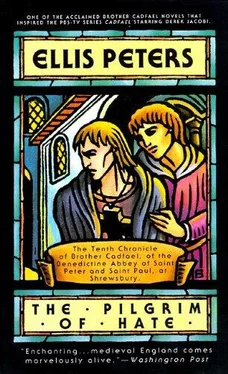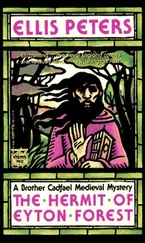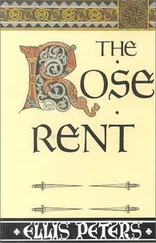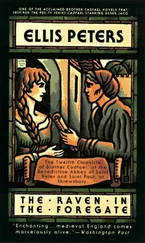Ellis Peters - The Pilgrim of Hate
Здесь есть возможность читать онлайн «Ellis Peters - The Pilgrim of Hate» весь текст электронной книги совершенно бесплатно (целиком полную версию без сокращений). В некоторых случаях можно слушать аудио, скачать через торрент в формате fb2 и присутствует краткое содержание. Жанр: Исторический детектив, на английском языке. Описание произведения, (предисловие) а так же отзывы посетителей доступны на портале библиотеки ЛибКат.
- Название:The Pilgrim of Hate
- Автор:
- Жанр:
- Год:неизвестен
- ISBN:нет данных
- Рейтинг книги:4 / 5. Голосов: 1
-
Избранное:Добавить в избранное
- Отзывы:
-
Ваша оценка:
- 80
- 1
- 2
- 3
- 4
- 5
The Pilgrim of Hate: краткое содержание, описание и аннотация
Предлагаем к чтению аннотацию, описание, краткое содержание или предисловие (зависит от того, что написал сам автор книги «The Pilgrim of Hate»). Если вы не нашли необходимую информацию о книге — напишите в комментариях, мы постараемся отыскать её.
The Pilgrim of Hate — читать онлайн бесплатно полную книгу (весь текст) целиком
Ниже представлен текст книги, разбитый по страницам. Система сохранения места последней прочитанной страницы, позволяет с удобством читать онлайн бесплатно книгу «The Pilgrim of Hate», без необходимости каждый раз заново искать на чём Вы остановились. Поставьте закладку, и сможете в любой момент перейти на страницу, на которой закончили чтение.
Интервал:
Закладка:
When the boy took up his crutches again and tapped his way out along the path towards the great court, Cadfael followed him at a distance, to watch his progress without embarrassing him. He could mark no change as yet. The stretched toe still barely dared touch ground, and still turned inward. And yet the sinews, cramped as they were, had some small force in them, instead of being withered and atrophied as he would have expected. If I had him here long enough, he thought, I could bring back some ease and use into that leg. But he’ll go as he came. In three days now all will be over, the festival ended for this year, the guest-hall emptying. Ciaran and his guardian shadow will pass on northwards and westwards into Wales, and Dame Weaver will take her chicks back home to Campden. And those two, who might very well have made a fair match if things had been otherwise, will go their separate ways, and never see each other again. It’s in the nature of things that those who gather in great numbers for the feasts of the church should also disperse again to their various duties afterwards. Still, they need not all go away unchanged.
Chapter Five
BROTHER ADAM OF READING, being lodged in the dortoir with the monks of the house, had had leisure to observe his fellow pilgrims of the guest-hall only at the offices of the church, and in their casual comings and goings about the precinct; and it happened that he came from the garden towards midafternoon, with Cadfael beside him, just as Ciaran and Matthew were crossing the court towards the cloister garth, there to sit in the sun for an hour or two before Vespers. There were plenty of others, monks, lay servants and guests, busy on their various occasions, but Ciaran’s striking figure and painfully slow and careful gait marked him out for notice.
“Those two,” said Brother Adam, halting, “I have seen before. At Abington, where I spent the first night after leaving Reading. They were lodged there the same night.”
“At Abingdon!” Cadfael echoed thoughtfully. “So they came from far south. You did not cross them again after Abingdon, on the way here?”
“It was not likely. I was mounted. And then, I had my abbot’s mission to Leominster, which took me out of the direct way. No, I saw no more of them, never until now. But they can hardly be mistaken, once seen.”
“In what sort of case were they at Abingdon?” asked Cadfael, his eyes following the two inseparable figures until they vanished into the cloister. “Would you say they had been long on the road before that night’s halt? The man is pledged to go barefoot to Aberdaron, it would not take many miles to leave the mark on him.”
“He was going somewhat lamely, even then. They had both the dust of the roads on them. It might have been their first day’s walking that ended there, but I doubt it.”
“He came to me to have his feet tended, yesterday,” said Cadfael, “and I must see him again before evening. Two or three days of rest will set him up for the next stage of his walk. From more than a day’s going south of Abingdon to the remotest tip of Wales, a long, long walk. A strange, even a mistaken, piety it seems to me, to take upon oneself ostentatious pains, when there are poor fellows enough in the world who are born to pain they have not chosen, and carry it with humility.”
“The simple believe it brings merit,” said Brother Adam tolerantly. “It may be he has no other claim upon outstanding virtue, and clutches at this.”
“But he’s no simple soul,” said Cadfael with conviction, “whatever he may be. He has, he tells me, a mortal disease, and is going to end his days in blessedness and peace at Aberdaron, and have his bones laid in Ynys Enlli, which is a noble ambition in a man of Welsh blood. The voluntary assumption of pain beyond his doom may even be a pennon of defiance, a wag of the hand against death. That I could understand. But I would not approve it.”
“It’s very natural you should frown on it,” agreed Adam, smiling indulgence upon his companion and himself alike, “seeing you are schooled to the alleviation of pain, and feel it to be a violator and an enemy. By the very virtue of these plants we have learned to use.” He patted the leather scrip at his girdle, and the soft rustle of seeds within answered him. They had been sorting over Cadfael’s clay saucers of new seed from this freshly ripening year, and he had helped himself to two or three not native in his own herbarium. “It is as good a dragon to fight as any in this world, pain.”
They had gone some yards more towards the stone steps that led up to the main door of the guest-hall, in no hurry, and taking pleasure in the contemplation of so much bustle and motion, when Brother Adam checked abruptly and stood at gaze.
“Well, well, I think you may have got some of our southern sinners, as well as our would-be saints!”
Cadfael, surprised, followed where Adam was gazing, and stood to hear what further he would have to say, for the individual in question was the least remarkable of men at first glance. He stood close to the gatehouse, one of a small group constantly on hand there to watch the new arrivals and the general commerce of the day. A big man, but so neatly and squarely built that his size was not wholly apparent, he stood with his thumbs in the belt of his plain but ample gown, which was nicely cut and fashioned to show him no nobleman, and no commoner, either, but a solid, respectable, comfortably provided fellow of the middle kind, merchant or tradesman. One of those who form the backbone of many a township in England, and can afford the occasional pilgrimage by way of a well-earned holiday. He gazed benignly upon the activity around him from a plump, shrewd, well-shaven face, favouring the whole creation with a broad, contented smile.
“That,” said Cadfael, eyeing his companion with bright enquiry, “is, or so I am informed, one Simeon Poer, a merchant of Guildford, come on pilgrimage for his soul’s sake, and because the summer chances to be very fine and inviting. And why not? Do you know of a reason?”
“Simeon Poer may well be his name,” said Brother Adam, “or he may have half a dozen more ready to trot forward at need. I never knew a name for him, but his face and form I do know. Father Abbot uses me a good deal on his business outside the cloister and I have occasion to know most of the fairs and markets in our shire and beyond. I’ve seen that fellow-not gowned like a provost, as he is now, I grant you, but by the look of him he’s been doing well lately-round every fairground, cultivating the company of those young, green roisterers who frequent every such gathering. For the contents of their pockets, surely. Most likely, dice. Even more likely, loaded dice. Though I wouldn’t say he might not pick a pocket here and there, if business was bad. A quicker means to the same end, if a riskier.”
So knowing and practical a brother Cadfael had not encountered for some years among the innocents. Plainly Brother Adam’s frequent sallies out of the cloister on the abbot’s business had broadened his horizons. Cadfael regarded him with respect and warmth, and turned to study the smiling, benevolent merchant more closely.
“You’re sure of him?”
“Sure that he’s the same man, yes. Sure enough of his practices to challenge him openly, no, hardly, since he has never yet been taken up but once, and then he proved so slippery he slithered through the bailiffs fingers. But keep a weather eye on him, and this may be where he’ll make the slip every rogue makes in the end, and get his comeuppance.”
“If you’re right,” said Cadfael, “has he not strayed rather far from his own haunts? In my experience, from years back I own, his kind seldom left the region where they knew their way about better than the bailiffs. Has he made the south country so hot for him that he must run for a fresh territory? That argues something worse than cheating at dice.”
Читать дальшеИнтервал:
Закладка:
Похожие книги на «The Pilgrim of Hate»
Представляем Вашему вниманию похожие книги на «The Pilgrim of Hate» списком для выбора. Мы отобрали схожую по названию и смыслу литературу в надежде предоставить читателям больше вариантов отыскать новые, интересные, ещё непрочитанные произведения.
Обсуждение, отзывы о книге «The Pilgrim of Hate» и просто собственные мнения читателей. Оставьте ваши комментарии, напишите, что Вы думаете о произведении, его смысле или главных героях. Укажите что конкретно понравилось, а что нет, и почему Вы так считаете.












